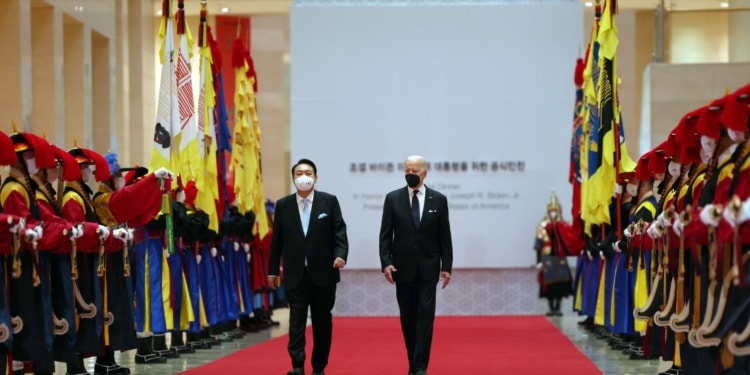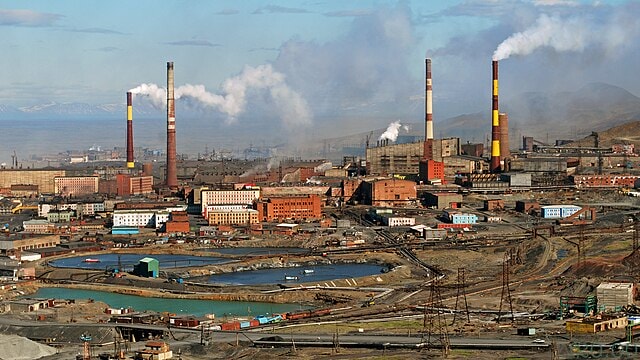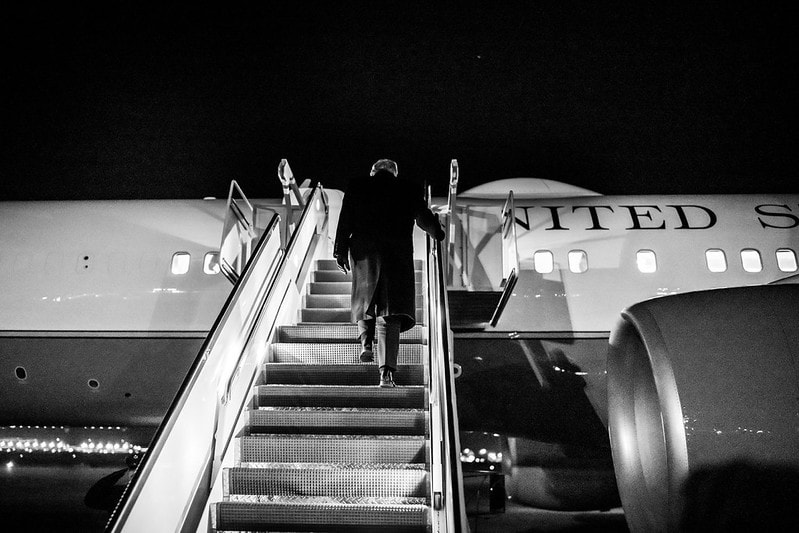President Joe Biden announced Monday the launch of a new Asia-Pacific trade deal, the Indo-Pacific Economic Framework for Prosperity (IPEF), meant to re-introduce an American influence in the region five years after Donal Trump pulled the United States out of the Trans-Pacific Partnership (TPP), granting China sole dominance over the Asian economic sphere.
The new alliance will bring the US together with twelve other Asian-Pacific nations – Japan, South Korea, Australia, Brunei, India, Indonesia, Malaysia, New Zealand, the Philippines, Singapore, Thailand, and Vietnam – making up 40% of the world economy. Taiwan, the self-ruled island China claims as its own, will not be part of the trade agreement. The decision was made despite last week’s bipartisan call from US lawmakers to include Taiwan and demonstrate solidarity at a moment when its autonomy is increasingly threatened by the Chinese government.
The White House also said the formation of this new bloc would help absorb the disastrous effects the COVID-19 pandemic and war in Ukraine had on the global economy, disrupting the entire scope of supply chains, and precipitating worldwide inflation. By outlining new standards for world trade, the IPEF is meant to assist the global market recover some stability.
“IPEF is a 21st century economic arrangement designed to tackle 21st century economic challenges,” said White House national security adviser Jake Sullivan.
This Monday, Joe Biden and Japan’s Prime Minister Fumio Kishida will be joined in Tokyo by several leaders of the nations enlisted for the alliance to officialise its launch, either in person like India’s Prime Minister Narendra Modi or virtually.
Took part in the programme to launch of the Indo-Pacific Economic Framework (IPEF), which will play a key role in furthering growth in the Indo-Pacific region. pic.twitter.com/IbJ372I7SX
— Narendra Modi (@narendramodi) May 23, 2022
The new partnership’s kick-off represents a cornerstone of Biden’s first trip as president to Asia, marking America’s renewed commitment to taking part in the region’s rising economy. With 60% of the world’s population, the region is expected to become the largest contributor to global growth over the next 30 years.
Launching IPEF also constitutes an important political move in anticipation of the midterm elections coming up in five months. The staggering increase in food and energy costs combined with stumbling stock markets spread fears of recession amongst American voters.
“We’re writing the new rules for the 21st century economy,” Biden said at the announcement. “They’re going to help all our countries’ economies grow faster and fairer. We’ll do that by taking on some of the most acute challenges that drag down growth.”
The four main goals: supply chain resiliency, clean energy, anti-corruption, and greater digital trade
Four trade goals have been outlined with the aim of structuring negotiations. They consist in coordinating efforts to secure supply chains, fighting corruption, developing sustainable energy, and expanding digital trade.
The task of overseeing discussions will be split between the US trade representative and the Commerce Department.
The US trade representative will focus on a particular aspect of the supply chain resiliency goal, namely, better workers protection policies after China’s admission into the World Trade Organization in 2001 resulted in a loss of US manufacturing jobs. Rising unemployment participated in the negative perception of trade deals, leading to Donald Trump’s decision to pull the US out of the Trans-Pacific Partnership in 2017 during his first full week in office.
Supply chain resiliency stands out as a major concern of IPEF since it’s been further compromised by the global pandemic and, more recently, Russia’s invasion of Ukraine.
Earlier this month, Joe Biden had also invited nine of the 10 members of the Association of Southeast Asian Nations (ASEAN) to a summit in Washington. At the event, the President of the US announced that the country would invest around $150 million in clean energy and infrastructure initiatives in ASEAN nations, paving the way for expanding sustainable energy in the Indo-Pacific region.
Related articles: China’s Fence-sitting On the War In Ukraine | The COVID Legacy: A Future Bipolar World?
How meaningful will this alliance be?
While most goals and related details still need to be negotiated among member countries, the framework is already drawing criticism. Some analysts doubt the new alliance will be solid enough to offer an appealing alternative to China as IPEF, contrary to other trade deals, does not offer signatories more access to US markets, nor does it advertise lower tariffs.
What IPEF does seem to offer its Asian allies may have less to do with economic prosperity and more with political safeguarding against the growing influence of China, now more threatening than ever since Putin’s invasion of Ukraine. Japan is particularly wary of China’s proximity with Russia as the two countries have been locked in a territorial dispute over a group of islands known as the southern Kurils in Russia and the Northern Territories in Japan for more than 75 years.
With few incentives yet great ambitions, notably, to raise labour and environmental standards, Biden’s IPEF may struggle to stand up to China’s Regional Comprehensive Economic Partnership, which it launched five months ago.
Comprising fifteen member countries, including most of the nations Biden enlisted for IPEF, the China-led trade bloc is the largest in history. As it focuses on limiting the number of administrative barriers to free trade in the region, it demands little of its members.
Another feature of the framework could nullify efforts to expand clean energy and infrastructure as IPEF member countries are free to choose which “pillar” they want to focus on and are not required to back all four.
US ready to intervene militarily if China were to invade Taiwan, says Biden
Joe Biden’s announcement of IPEF’s kickoff on Monday led to a diplomatic backlash from Beijing following the US President’s comments on Taiwan.
Asked at the news conference if the US would be willing to get involved militarily if China were to invade Taiwan, Biden answered: “Yes. That’s the commitment we made.”
Biden continued to recognize the “One China” policy the US agreed to, by which the US acknowledged Beijing as the sole government of China and renounced diplomatic relations with the self-ruled island of Taiwan, which China claims as its own.
Under this agreement, the US has traditionally avoided making any explicit comments regarding the security of Taiwan against an eventual Chinese invasion, cultivating an atmosphere of “strategic ambiguity.”
Biden’s forceful presidential statement marks an apparent rupture with this tradition – although a White House official said Biden’s comments did not reflect a policy shift.
Biden’s statement nevertheless indicates a major shift in diplomatic relationships following Russia’s onslaught on Ukraine, which some analysts fear could incentivize Beijing to conduct its own attack against Taiwan, despite China’s efforts to appear neutral on Ukraine’s issue.
“We agree with the ‘One China’ policy, we signed onto it,” said Biden. “But the idea that [Taiwan] could be taken by force is just not appropriate. It would dislocate the entire region and another action similar to what happened in Ukraine.”
The US President’s statement attracted an angry response from the Chinese Foreign Ministry spokesperson Wang Wenbin, who expressed “strong dissatisfaction and resolute opposition” to Biden’s comments.
“China has no room for compromise or concessions on issues involving China’s core interests such as sovereignty and territorial integrity,” Wenbin said.
It was confirmed by White House national security adviser Jake Sullivan on Sunday that Taiwan would not be among the member nations of IPEF, despite the agreement being advertised as an open platform so as to encourage “sustainable and inclusive” economic growth.
The US still plans on conducting trade talks with Taiwan, albeit one to one. Since the self-ruled island is a leading manufacturer of computer chips in the region, and new standards for the digital economy a pillar of IPEF, it is unlikely that ways to commerce with Taiwan will not be discussed among IPEF member countries.
According to an administration official, talks are expected to reach their conclusion by late June or early July, with agreements ready to be sent to each government for ratification within 12 to 18 months. The anonymous official added that reaching consensus within the US government would also be key to the realisation of the new Indo-Pacific trade deal.
Editor’s Note: The opinions expressed here by Impakter.com columnists are their own, not those of Impakter.com — In the Featured Photo: Official Dinner in honour of The Honorable Joseph R. Biden, Jr. President of the United States of America, at the National Museum of Korea, Yongsan-gu, Seoul, on May 21, 2022. Featured Photo Credit: Jeon Han/Republic of Korea/Flickr.













